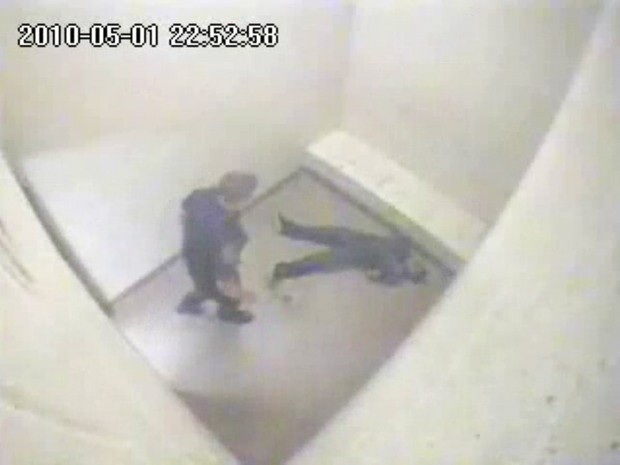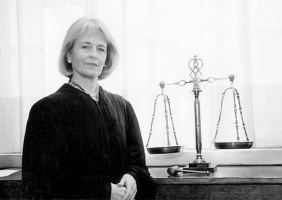Trial to begin for White Meriden Cop who Cracked Skull of Handcuffed, Compliant Latino Man (expect White Supremacy from white Judge & Jury)

Police Officer Evan Cossette is charged with police brutality and obstruction of justice charges following an investigation into a 2010 incident in which he shoved a handcuffed Latino prisoner, Pedro Temich into a jail cell, cracking the his skull on concrete. He then attempted to cover it up. Unbeknoest to Cossette a video tape shows Cossette entering the cell at least six times and moving the unconscious Temich around, twice propping him up against the bench and another time putting him back on the floor so that the man's handcuffs could be removed. [MORE]. The incident wasn't reported to police administrators until six weeks later. [MORE] Evan Cossette is the son of Police Chief Jeffry Cossette,
From [HERE] At least one emergency dispatcher, a toxicology expert, and several local police officers are expected to testify in the trial which begins Tuesday in U.S. District Court in New Haven. Judge Janet Bond Arterton, who is white, will preside over the case, which may last about a week.
 A federal grand jury indicted Cossette in November on charges that he pushed prisoner Pedro Temich backwards onto a concrete bench in a holding cell. The videotape shows Cossette pushing the handcuffed prisoner, Pedro Temich, backward into the jail cell, causing Temich to cut open his head on a concrete bench. The indictment calls it a "firm shove" of the "compliant and handcuffed" Temich, causing him to fall back. Temich was taken to MidState Medical Center in Meriden and required 12 stitches in the back of his head.
A federal grand jury indicted Cossette in November on charges that he pushed prisoner Pedro Temich backwards onto a concrete bench in a holding cell. The videotape shows Cossette pushing the handcuffed prisoner, Pedro Temich, backward into the jail cell, causing Temich to cut open his head on a concrete bench. The indictment calls it a "firm shove" of the "compliant and handcuffed" Temich, causing him to fall back. Temich was taken to MidState Medical Center in Meriden and required 12 stitches in the back of his head.
Temich, who had been arrested on charges that he fled the scene of an accident, fell onto a concrete bench and lost consciousness. In the video, Cossette is seen repositioning the unconscious prisoner before medics arrive (6 times). [MORE]
Cossette was charged with using excessive force and falsifying a report on the incident. Cossette has pleaded not guilty and is on administrative leave. He faces up to 20 years in prison and $500,000 in fines if convicted. FBI special agent William Aldenberg attended a pre-trial conference last month and is expected to testify about the FBI’s investigation into the allegations against Cossette.
One piece of evidence remains at issue ("at issue" only for racists/white supremacists who Don't want you to believe what you see! -bw): a widely viewed police surveillance video that shows Temich backing into the holding cell and Cossette shoving him thereafter repositioning the corpse (six times) as he lay motionless on the floor.
Cossette’s lawyer sought to block jurors from seeing the video calling it prejudicial and argued it was altered, and that no original copy exists. Government attorneys responded that the video is a combination of three surveillance videos on a system that automatically records over them unless downloaded. A central portion of the video was routinely deleted by police, government attorneys said last month. The government expects to call a police captain to explain what was on the missing portion.
Arterton denied the request to block the video, but said Cossette’s lawyer could raise concerns again during the trial.
Cossette has said Temich spun around and was invading his space when Cossette opened the door causing him to defend himself.
The government is also asking two dispatchers to describe the activity in the holding cell as they monitored it live at their work stations. One dispatcher, according to court records, is believed to have called paramedics to assist Temich.
Prosecutors are also expected to call former Officer Leighton “Buddy” Gibbs. Now retired, Gibbs initially backed Cossette’s version of events during an internal affairs investigation about the incident. But Gibbs recanted his testimony to the FBI, saying that Temich made no furtive motions to Cossette.
Cossette’s defense has asked Dr. Joel Milzoff, of Glastonbury to address how Temich’s high blood alcohol content affected him physically and cognitively on the night he was arrested in May 2010, according to court documents.
Temich registered a .321 blood alcohol level when arrested, or four times the legal limit, according to police and court records.
A witness list for the government likely wouldn’t be released before the trial, according to Tom Carson, a spokesman for the U.S. attorney for Connecticut.
Names read to potential jurors earlier this month included a host of Meriden police officers and command staff, including Chief Jeffry Cossette. A number of other names were also read, including Pedro Temich.
Not all the people mentioned to jurors will necessarily be used as witnesses, Carson said.
“It just means that their names will come up during the trial,” he said.
Raymond Hassett, Cossette’s attorney, declined to release his witness list and said he wasn’t sure who the government was bringing to the stand. Names read by Hassett to potential jurors included Sally Roberts, a New Britain attorney representing Temich in a civil suit, and Hartford attorney Thomas Daily.
Daily was hired by the city to investigate allegations that Cossette had a pattern of using excessive force, and that top-ranking police officials disciplined him less harshly than they did other officers accused of similar behavior. Daily released a report in late May 2012 stating his research found little to substantiate the allegations of excessive force and disparate treatment.
Officers Donald Huston and Brian Sullivan brought the allegations to City Manager Lawrence J. Kendzior in a letter outlining the Temich incident among other matters. Daily and an internal affairs investigation found many of the allegations in the officers’ complaint without merit and they now face discipline.
Both Huston and Sullivan were named by the government during jury selection, with Sullivan expected to testify.
Private investigator Rick Siena, who worked for Roberts, is also on the defense list.
Temich was arrested after police said he fled the scene of a hit-and-run accident on May 1, 2010 and was unaware of the cause of his injury until Roberts showed him the police surveillance video. Temich was charged with evading responsibility, interfering/ resisting and criminal attempt to commit assault on an officer. The Meriden court clerk and state Judicial Branch website do not have a record of the case, indicating that the charges may have been dropped by the state or dismissed following completion of a diversionary program.
Roberts also represents two other clients, Robert Methvin and Joseph Bryans who have each filed brutality complaints against Cossette in separate incidents.
Under a pre-trial agreement, the government can’t introduce the Methvin and Bryans incidents or other allegations of excessive force against Cossette unless his defense raises them.
For its part, the defense can’t bring up Temich’s alleged aggressive behavior in an ambulance ride after the injury, nor can it introduce the Daily report as evidence.